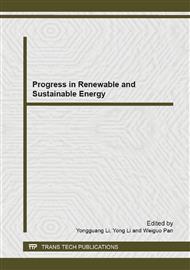p.1483
p.1487
p.1492
p.1501
p.1506
p.1511
p.1529
p.1533
p.1537
Geographic Concentration of Korean Oil Imports and the Implications
Abstract:
This paper analyzes the changes of geographic concentration of Korean oil imports as well as its interactive relationship with oil security and oil cost. We employ Herfindahl-Hirschman index to capture the changing geographic concentration of both crude oil imports and petroleum product imports. Using data ranging from 1970 to 2009, we document that the geographic concentration of oil is closely related to both energy security and energy cost. Geographical dispersion of oil imports may improve energy security but usually generates higher energy cost. We thus argue that there can be an optimum level of geographic concentration of energy imports. Both oil security and economic efficiency should be taken into consideration when making national energy strategies.
Info:
Periodical:
Pages:
1506-1510
Citation:
Online since:
December 2012
Price:
Сopyright:
© 2013 Trans Tech Publications Ltd. All Rights Reserved
Share:
Citation:


